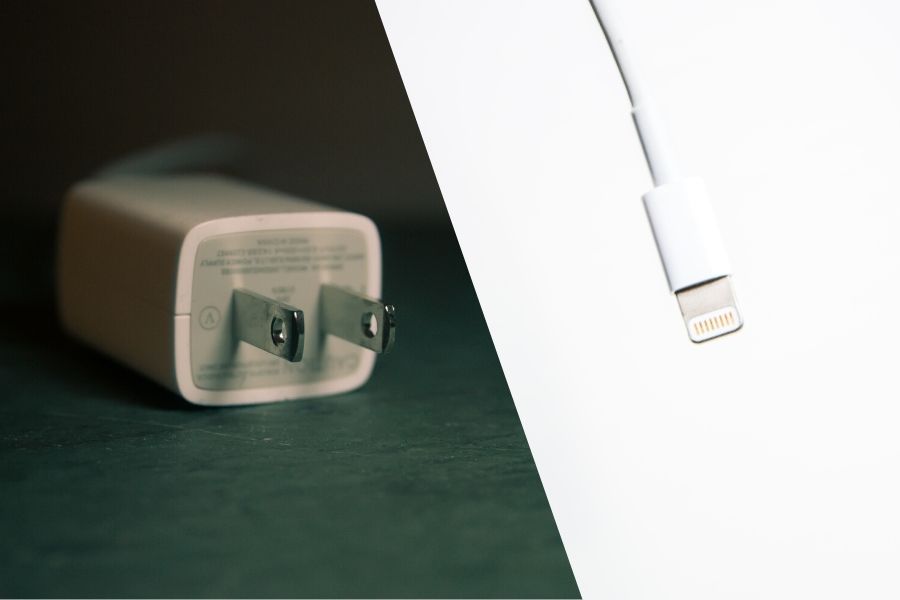
Electronics can sometimes be confusing. With so many terms, cords, and objects, it can be hard to figure out what each one does and which one you should be using. Chargers and adapters fall into the category of being mixed up a lot, so what are the actual differences between them?
Adapter vs. Charger: What is the Difference? Although they seem to serve the same purpose, an adapter and a charger are two different electronic accessories that can sometimes work together. An adapter is something that is used to charge a charger, while a charger is used to charge an electronic item such as a phone or a laptop.
| Adapter | Charger |
| Chargers a charger | Charges a battery |
| Adapts and converts voltages | Pulls electric current out of an adapter |
| Has no internal electronics | Converts AC to DC power |
| Provides a power supply | Not all charger work the same |
Knowing the difference between chargers and adapters is a great way to make sure you are using the right tool for the job. Let’s talk about what makes them so different and if you are using the right one for you!
Adapter vs. Charger: What is the Difference?
Like many electronic accessories, chargers and adapters are something that gets confused easily. They seem like they do the same thing, but they perform different actions that are often complemented by one another.
Adapters are an object that can help charge a charger. They provide a power supply and help to convert one type of voltage into another kind. When you are visiting other countries, you are using an adapter to charge your electronic items. Not only is this because of different outlet shapes, but also due to various electrical currents. Adapters themselves do not have the internal means necessary to charge a battery.
Chargers, on the other hand, are meant to charge a battery. If being used with an adapter, they take the electrical current out of it and convert it from AC power to DC power to be used with the battery. Chargers can also help regulate the amount of electricity coming from an adapter or a wall socket to make sure the electronic item is not receiving too much. One negative side of chargers is that they can be specific to the type of device they charge.
Chances are you probably have a plethora of both adapters and chargers in your home. Make sure that you are not only using them for their intended purpose but that the adapter or charger you are using is compatible with the electronic object you are trying to power.
Adapters

Adapters are an essential tool for anyone who is looking to use electronics. An adapter can help two electronic items work together, such as computer cords or video game consoles. If you’ve ever traveled abroad to another country, you may have probably found yourself using an adapter in order to use your electronic items or to help you charge something. The part of the device that enables you to plug in your devices to the wall outlet is known as the adapter.
Adapters are ultimately a source of power. Adapters help to adapt the voltage coming out of an outlet to what your electronic device needs. Unlike a battery or charger, an adapter contains no internal elements that store power in order for the electronic item to stay alive without being plugged in.
There are two main types of adapters that are used. These include the AC adapter and the DC adapter. You can find out what kind of adapter your electronic device needs by checking the back of the device, or you can also check the power supply box if your device is using one.
AC Adapter
AC Adapters stands for alternating current adapters. This means that the electrical current it uses is in a reverse direction. The current goes from a positive current to a negative current in one interval. If you are looking to change the voltage of an AC current, then an AC adapter is your best option. These types of adapters will often be given an input interval to know the voltage of them.
DC Adapter
DC adapters are different in that their current only flows in one direction. Unlike AC adapters, they have a constant flow and no changes in the polarity of the current. DC adapters take the alternating energy currents and change it into direct currents. DC adapters are also rated based upon their maximum output.
Chargers

A lot of us use multiple chargers daily. These take an AC power current and turn it into a DC current that can be used on most electronic devices. A charger is often used to charge a battery or an electronic device such as a phone, handheld gaming device, or headphones. One of the downsides of using a charger is that not all chargers work for different devices.
When used with an adapter, a charger will take the electric current that is being provided by the adapter. It will then take that energy and transform it into the voltage that the particular device needs in order for the battery to begin to charge. Basically, the cord that is charging your computer is not what is needed to charge your smartphone.
Not all chargers are created equal. It can sometimes be challenging to find a third party charger that works with your electronic device. Some chargers are not required to plug into a wall outlet. Power banks, wireless chargers, and car chargers run off of their own power source in which an adapter would not be useful. Most chargers that are not directly connected to a wall outlet will not have the same output as those that are connected.
Are Adapters and Chargers the Same Thing?
Although adapters and chargers seem like they almost do the same thing, they each have their restrictions. Adapters can sometimes be used as a charger, but a charger will never give you the same energy output as an adapter will. When it comes to some electronic devices such as laptops, your charging cord and your adapter are pretty much the same thing.
Adapters will provide electrical current to something such as a laptop. As an example, if you find that your computer will not hold a charge from the battery, you should still be able to use that device as long as your adapter is plugged into it. Chargers work with rechargeable batteries, which means if there is something wrong with your battery, you are not going to be able to use that device once the current battery life runs out.
Which Should You Be Using?
If you are looking to connect an electrical device to a secondary power source, then an adapter will make sure that you are getting the proper amount of voltage without ruining your equipment. For those who are traveling, the adapter part of your converter makes sure that your plugs will fit into different wall sockets. If you are using an electronic device that is not specified as handheld, you should be using the adapter that came with it or one that is specified for use. This includes game console systems, desktop computers, televisions, etc.
A charger should only be used on an electronic device that contains a rechargeable battery. Phones, handheld gaming systems, or laptops are all items that you should stick to the charger with. The charger knows the amount of voltage that a particular item needs, and it will charge the internal battery on a device so that you can use it wirelessly once the battery is charged.
Sources:
https://www.howtogeek.com/175734/htg-explains-can-you-use-any-charger-with-any-device/
http://www.micropowerchina.com/news-for-power-adapterbattery-charger/the-difference-between-the-charger-and-power-adapter-25.html
